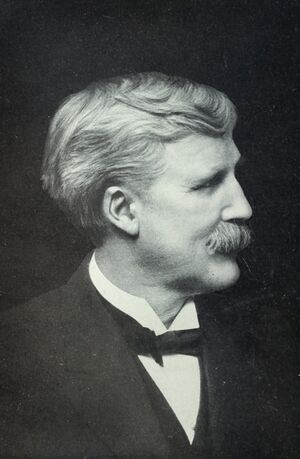Difference between revisions of "Frederick Taylor Gates"
(stub) |
m (add quote) |
||
| (One intermediate revision by the same user not shown) | |||
| Line 1: | Line 1: | ||
{{person | {{person | ||
|wikipedia=https://en.wikipedia.org/wiki/Frederick_Taylor_Gates | |wikipedia=https://en.wikipedia.org/wiki/Frederick_Taylor_Gates | ||
| − | + | |constitutes=clergyman,advisor,deep state operative | |
| − | |constitutes= | + | |image=Portrait of Frederick Taylor Gates.jpg |
| − | |image= | ||
|interests= | |interests= | ||
|nationality=US | |nationality=US | ||
| Line 10: | Line 9: | ||
|death_date=February 6, 1929, | |death_date=February 6, 1929, | ||
|death_place= Phoenix, Arizona | |death_place= Phoenix, Arizona | ||
| − | |description= | + | |description=The principal business and philanthropic advisor to the major oil industrialist [[John D. Rockefeller]], Sr. |
|parents= | |parents= | ||
|alma_mater=University of Rochester,Rochester Theological Seminary | |alma_mater=University of Rochester,Rochester Theological Seminary | ||
| Line 18: | Line 17: | ||
'''Frederick Taylor Gates''' was an American [[Baptist]] clergyman, educator, and the principal business and philanthropic advisor to the major oil industrialist [[John D. Rockefeller]], Sr., from 1891 to 1923.<ref>https://timesmachine.nytimes.com/timesmachine/1929/02/07/95877097.pdf</ref> | '''Frederick Taylor Gates''' was an American [[Baptist]] clergyman, educator, and the principal business and philanthropic advisor to the major oil industrialist [[John D. Rockefeller]], Sr., from 1891 to 1923.<ref>https://timesmachine.nytimes.com/timesmachine/1929/02/07/95877097.pdf</ref> | ||
| − | + | {{SMWQ | |
| + | |subjects=General Education Board,education | ||
| + | |text=In our dreams, we have limitless resources and the people yield themselves with perfect docility to our molding bands. The present [[education]] conventions fade from their minds, and unhampered by tradition, we work our own good will upon a grateful and responsive rural folk. We shall not try to make these people or any of their children into philosophers or men of learning, or men of [[science]]. We have not to raise up from among them authors, editors, poets or men of letters. We shall not search for embryo great [[artists]], [[painters]], [[musicians]] nor [[lawyers]], [[doctors]], [[preachers]], [[politicians]], statesmen, of whom we have an ample supply. | ||
| + | . | ||
| + | The task we set before ourselves is very simple as well as a very beautiful one, to train these people as we find them to a perfectly ideal life just where they are. So we will organize our children and teach them to do in a perfect way the things their fathers and mothers are doing in an imperfect way, in the homes, in the shops and on the farm. | ||
| + | |authors=Frederick T. Gates | ||
| + | |date= | ||
| + | |source_name=Frederick T. Gates, "The Country School of Tomorrow," Occasional Papers, no.1 (New York: General Education Board, 1913), p. 6. | ||
| + | |source_URL=http://www.sntp.net/education/leipzig_connection_6.htm | ||
| + | }} | ||
Latest revision as of 05:39, 6 December 2021
(clergyman, advisor, deep state operative) | |
|---|---|
 | |
| Born | July 22, 1853 New York State |
| Died | February 6, 1929, (Age 75) Phoenix, Arizona |
| Nationality | US |
| Alma mater | University of Rochester, Rochester Theological Seminary |
| Founder of | General Education Board |
The principal business and philanthropic advisor to the major oil industrialist John D. Rockefeller, Sr. | |
Frederick Taylor Gates was an American Baptist clergyman, educator, and the principal business and philanthropic advisor to the major oil industrialist John D. Rockefeller, Sr., from 1891 to 1923.[1]
“In our dreams, we have limitless resources and the people yield themselves with perfect docility to our molding bands. The present education conventions fade from their minds, and unhampered by tradition, we work our own good will upon a grateful and responsive rural folk. We shall not try to make these people or any of their children into philosophers or men of learning, or men of science. We have not to raise up from among them authors, editors, poets or men of letters. We shall not search for embryo great artists, painters, musicians nor lawyers, doctors, preachers, politicians, statesmen, of whom we have an ample supply.
.
The task we set before ourselves is very simple as well as a very beautiful one, to train these people as we find them to a perfectly ideal life just where they are. So we will organize our children and teach them to do in a perfect way the things their fathers and mothers are doing in an imperfect way, in the homes, in the shops and on the farm.”
Frederick T. Gates [2]
References
- ↑ https://timesmachine.nytimes.com/timesmachine/1929/02/07/95877097.pdf
- ↑ http://www.sntp.net/education/leipzig_connection_6.htm Frederick T. Gates, "The Country School of Tomorrow," Occasional Papers, no.1 (New York: General Education Board, 1913), p. 6.
Wikipedia is not affiliated with Wikispooks. Original page source here